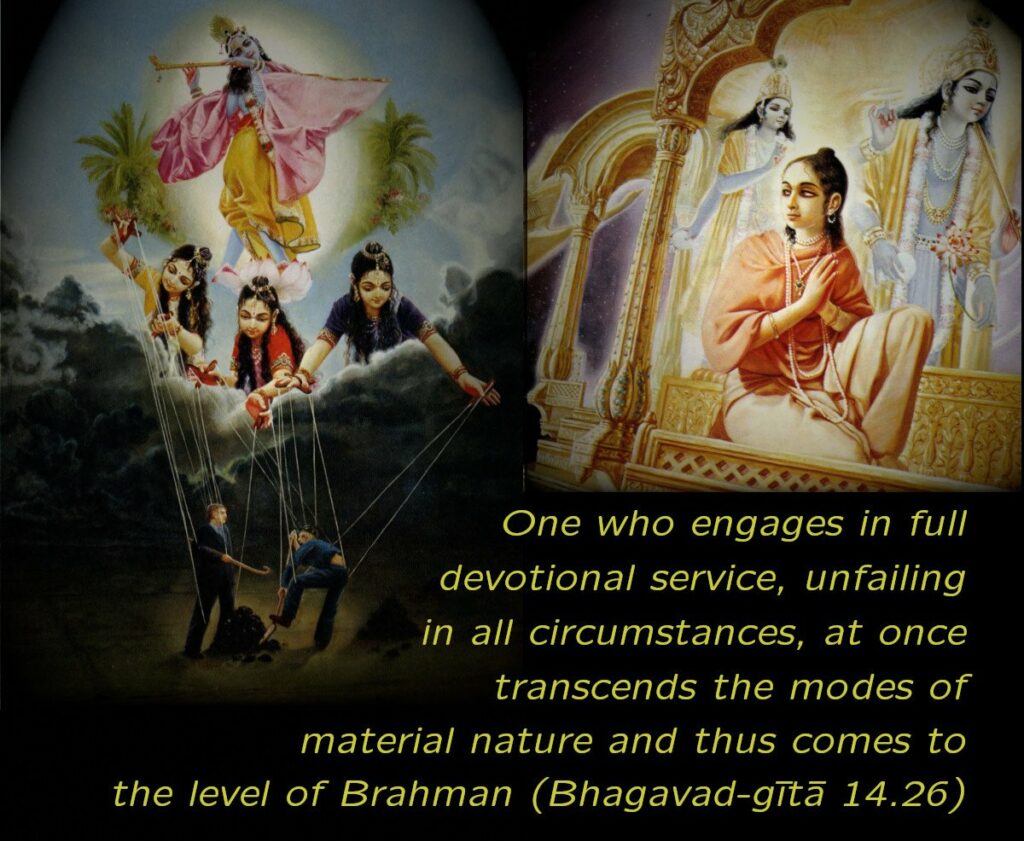मां च योऽव्यभिचारेण भक्तियोगेन सेवते |
स गुणान्समतीत्यैतान्ब्रह्मभूयाय कल्पते || 26||
māṁ cha yo ’vyabhichāreṇa bhakti-yogena sevate
sa guṇān samatītyaitān brahma-bhūyāya kalpate
mām—me; cha—only; yaḥ—who; avyabhichāreṇa—unalloyed; bhakti-yogena—through devotion; sevate—serve; saḥ—they; guṇān—the three modes of material nature; samatītya—rise above; etān—these; brahma-bhūyāya—level of Brahman; kalpate—comes to
Translation:
And he who worships Me with the yoga of undeviating love rises above the gunas and becomes fit to be one with Brahman.
Commentary:
Paramatma is beyond the three Gunas. To go beyond them is the way to become Brahman. But how to cross over the Gunas? A great deal of enquiry, self-control, meditation is necessary for it. But here, the Lord declares that self-realisation is possible for one who is devoted to Him with single-minded devotion (Bhakti). Bhakti helps the devotee to transcend the Gunas. It is to be noted that in every Discourse, whatever may be the yoga taught in it, the Lord emphasises Bhakti as the universal element in all kinds of practices. In this Discourse in which pure knowledge is taught, the Lord introduces the idea of Bhakti and the need for devotion at the end. Whether man takes to Karma Yoga, Jnana Yoga or Dhyana Yoga, he should cultivate Bhakti, devotion to the Lord. This devotion is the life-force for all yogas. Without it, no spiritual progress is possible. Bhakti of the lower type is not enough. It should be ‘avyabhicharini‘ (i.e.) undivided, not attached to anything else except the Supreme Lord. Pure Bhakti requires the highest renunciation. The mind should be centred in the Lord totally and completely. The world has no place in the mind of the true devotee. The Lord only and nothing else that is the devotee’s attitude. When this attitude – is confirmed, the devotee easily goes beyond the Gunas, and the Brahmanubhuti comes to him of its own accord. To be constantly thinking of the Lord, his wonderful power, beauty, joy, peace, bliss and blessedness, to love Him as the life of his life and the soul of his soul, to see Him in all beings, in all actions, and thoughts, to sing His name and glory, to offer up everything to Him,- this is Bhakti. As Bhakti is more congenial for embodied human beings, the Lord emphasises the need for it in attaining the highest state of the Gunatita and Brahmajnana.
Samatitya: This term is used to show that the devotee can transcend the Gunas, totally and completely.
This verse is the Lord’s answer to Arjuna’s question “Katham chai tam stringunan ativartate” (How can a person go beyond those three Gunas?). By firm devotion, man acquires knowledge which takes him beyond the Gunas to Paramatman. This is the way to transcend the Gunas.
Sri Ramakrishna Says —
At the sight of Shivanath the Master cried out joyously: “Ah! Here is Shivanath! You see, you are a devotee of God. The very sight of you gladdens my heart. One hemp-smoker feels very happy to meet another. Very often they embrace each other in an exuberance of joy.” The devotees burst out laughing.
….. “Worldly people will never listen to you if you ask them to renounce everything and devote themselves whole-heartedly to God. Therefore Chaitanya and Nitai, after some deliberation, made an arrangement to attract the worldly. They would say to such persons, ‘Come, repeat the name of Hari, and you shall have a delicious soup of magur fish and the embrace of a young woman.’ Many people, attracted by the fish and the woman, would chant the name of God. After tasting a little of the nectar of God’s hallowed name, they would soon realise that the ‘fish soup’ really meant the tears they shed for love of God, while the ‘young woman’ signified the earth. The embrace of the woman meant rolling on the ground in the rapture of divine love.
“Nitai would employ any means to make people repeat Hari’s name. Chaitanya said: ‘The name of God has very great sanctity. It may not produce an immediate result, but one day it must bear fruit. It is like a seed that has been left on the cornice of a building. After many days the house crumbles, and the seed falls on the earth, germinates, and at last bears fruit.’ (Source: Gospel of Sri Ramakrishna)
Bhagavad Gita: Chapter 14 🔻 (27 Verses)
